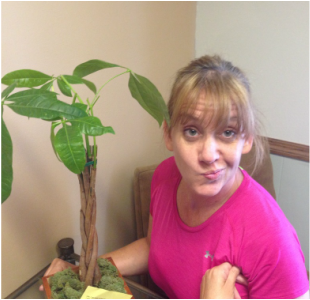 Burnout. I had to really examine the word when I was at the doctor a couple weeks ago. I had all these symptoms, scary symptoms, that I could not seem to shake with my diet choices, supplements, and attempts to sleep. I had no energy or desire to hang out with my friends, I was neglecting my health and I had become disillusioned with my work. There wasn’t one single catalyst—it wasn’t that I stopped liking the kind of work I did, generally speaking, I had lost balance. I lost focus on the bigger picture. I had become what I preach to my clients NOT to become, I had become a workaholic and now “officially” diagnosed with “burnout”. It is a classic case of burnout: multiple, chronic stressors over an extended period of time left me totally drained and no longer performing at my best. In a few short years, I went from bright-eyed and bushy-tailed to seriously burnt out and suffering from digestive and heart issues. Burnout costs U.S. industry $300 billion annually, as measured by absenteeism, decreased productivity, employee turnover, and direct medical, legal, and insurance fees. The American Institute of Stress reports that nearly half of all American workers suffer from symptoms of burnout. One of those Americans is me, is it you too? Overcoming burnout doesn’t happen overnight, instead it is a calculated effort. It is a commitment to yourself, your family, your professional life…that commitment comes with taking time for yourself and setting boundaries. Take Relaxation Seriously Whether you take up meditation, listening to music, reading a book, getting a massage, taking a walk or visiting with friends and family, truly think about what you’ll do to relax, and designate time for it. Cultivate a Rich Non-Work Life Find something outside of work that you are passionate about that’s challenging, engaging and really gets you going—whether a hobby, sports or fitness activities or volunteering in the community (along with other items we mention here, like relaxation, being able to “turn off” and participating in rewarding non-work activities). Unplug While communication technology can promote productivity, it can also allow work stressors seep into family time, vacation and social activities. Set boundaries by turning off cell phones at dinner and delegating certain times to check email. Get Enough Sleep Research suggests that having fewer than six hours of sleep per night is a major risk factor for burnout, not least because poor sleep can have negative effects on your job performance and productivity. It can lead to fatigue, decrease your motivation, make you more sensitive to stressful events, impair your mental function, leave you more susceptible to errors and make it harder to juggle competing demands. The reverse is true, too: We’ve seen that sleep can actually improve your memory. Recovering from chronic stress and burnout requires removing or reducing the demands on you and replenishing your resources. Sleep is one strategy for replenishing those resources. Contemplate massage and red light therapy to help with sleep, they have helped me. Get Organized Often, when people are burnt out, they spend a lot of time worrying that they’ll forget to do something or that something important is going to slip through the cracks. That is (was) me. Get organized, clear your head, put together a to-do list (or an electronic task list) then prioritize. That way, you don’t have to keep thinking about those things because you’ll have systems in place to remind you. Stay Attuned It’s important to tune into the precursors of those conditions, physical signs that you might be under too much stress: more headaches, tight shoulders, a stiff neck or more frequent stomach upset. In terms of mental health, burnout affects depression, and if you’re depressed, that can also affect your level of burnout—it goes both ways. So, if the issues you’re struggling with are really serious and getting worse, you may need to seek professional help. It took by doctor to point out my burnout, some may need the help of a psychologist or therapist to talk out some problems. Know When It’s You, and When It’s Them Burnout is sometimes motivated by internal factors. You’ll need to ask yourself, “Where is this coming from?” so you can figure out what’s stressing you out, and how to maintain your internal resources to keep yourself motivated, doing your best work and functioning well. Some burnout really is the fault of work. With companies trying to get more out of their employees, fear of cutbacks and layoffs, freezing wages, more and more pressure to perform is being put on employees. Figure Out When Enough Is Enough Consider talking to your manager or HR. angle the conversation about how those cultural shifts will enable you to continue to serve the company and become an even better employee. I do think there are times when, no matter what you try to do, the organization is unable or unwilling to make those changes, and in those cases, it is just time to move on. It isn’t worth your relationships, your health. As a business owner, as many of you are, you may need to learn to delegate responsibility. Step away from the need to micromanage your employees. Maybe, step away from the business you have built with a sabbatical or sale. As for me, every day I make my list, learn to say ‘no’, turning off my phone and computer, getting a massage, and setting aside time for me to just do what I want to do. It is a hard process. But my health, my relationships and the clinic mean enough to me, I need to create those boundaries. You are in control of your environment, make the changes to create more time for you and those who are important to you.  To be without stress is to be without life.” I either heard this first during middle school biology, or an undergrad athletic training class. I’m sure we would all like to be stress free at work, at home, and at play…but let’s face it, life happens and stress is life. The good news is that there exists eustress, or good stress, which occurs naturally over the course of our lives, even back to first learning how to walk. Eustress is a place of learning and discovery that makes us stronger all the while leaving us with a surplus of resources to continue this process. Distress is the yin to the yang of eustress. Distress is a place of survival that uses up resources and leaves us stripped down and vulnerable. Survival is not a fun place to be and our bodies can only take a certain amount until we start breaking down. Each person seems to have there own way of expressing this state of being, but it can always be tied back to stress, be it physical, mental, or emotional. Now, everything is a spectrum and there are no absolutes. I’ve already discussed eustress at one end and distress at the other. Stress can be good and it is truly necessary to stress our system in order to make gains, but where is the threshold? How often do we push our bodies beyond the point where we are no longer pushing ourselves, but instead literally trying to survive our workouts, our schedules, and our lives. Let me create a mental picture for you to help make a point. There are three (equally attractive) people running down the road all at the same pace. One is breathing through their nose with a relaxed face, the second is breathing through their mouth with no apparent distress, and the third is breathing loudly through their mouth. In this moment, where do these people fall on this spectrum and which would you rather be? I know that there are those among us that use exercise to relieve stress. Awesome! Keep it up! But also ask yourself what type of stress you are adding to your life? How often do you do something restorative to balance things out and press a resent button? Do you ever go to a place of eustress during the day, or even at night? How restful is your sleep? All of my writing about stress was really to bring me to this point…your mood and stress level affects behavior, movement is a behavior and breathing is movement. If we are stressed physically, mentally, or emotionally, it will change how we breathe. It is not uncommon that people go from a stressed breathing strategy during the day right into a workout where they are essentially hyperventilating the whole time. This cycle can be all to real and may very well even manifest itself at night affecting your sleep. Breathing is the only function of our autonomic nervous system over which we have volitional control, and thus can be a useful indicator of where we are on our spectrum and a tool to make improvements. Take a minute and check in with yourself… -Can you breath in and out silently through your nose? Are you still silent if you plug your ears? -Can you breath like this for one minute with a 3 second inhale and a 6 second exhale? Can you do it without pausing or breath holding? If you cannot breath in silently through your nose at a controlled rate, I can guarantee your life, your exercise, and your sleep are not as efficient and restorative as they could be. More good news, there are things you can do to make improvements. You can start by taking time to practice silent breathing one minute at a time throughout the day with your lips together, teeth apart, and tongue on the roof of your mouth. So here’s to a good life. Get out and ‘eu-‘ something! ~Dr. Dan DPT, ATC, OCS |
AuthorSA little from Dr. Dan, a little from Lisa but always a lot of good stuff! Archives
January 2024
Categories
All
Or
|
Your Orthopedic Wellness Clinic
Located at:
285 N Janacek Rd, Suite C
BROOKFIELD, WI
285 N Janacek Rd, Suite C
BROOKFIELD, WI
HOME TO APPROVED THERAPIST FOR:
©2022 MOMENTUM MOVEMENT CLINIC

 RSS Feed
RSS Feed





